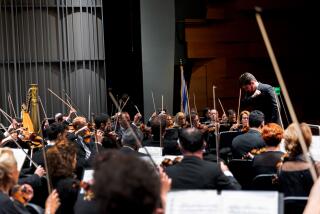Zukerman’s Youthful Zest Buoys Sonatas
- Share via
Youth sticks with some people. Pinchas Zukerman, the justly celebrated Israeli-bornviolinist who has been visiting Southern California for more than 30 years, looks young and plays the fiddle with his accustomed brio, despite accumulating maturity and gray hair--he is now 52.
At his latest local recital, with his longtime musical collaborator, pianist-composer Marc Neikrug, Wednesday night in the Dorothy Chandler Pavilion, Zukerman again seemed the forever-young virtuoso: expressively resourceful, infectiously musical, technically impeccable, effortless. As usual, it was a joy to be in his musical company.
For connoisseurs, the peak of his sonata recital was Bartok’s thorny but irresistible Second Sonata (1922), a work not heard here live since he and Neikrug last played it, in Costa Mesa, in 1993.
The pair seem to own it, so easily and compellingly do they lay out its clear narrative, its changing moods and emotional life. Authority and spontaneity informed their detailed, sweeping performance. Again, it made one wonder why this great and breathtaking work is played so seldom.
The team surrounded that masterpiece with more familiar sonatas, by Beethoven and Franck, in A major. Beethoven’s Opus 30, No. 1, gentlest and most pastoral of the composer’s three violin/piano sonatas in that key, began the evening serenely, its many virtues subtle and beautifully understated. One had to admire every facet of this polished performance.
It might seem, by this time in musical history, that no one can find a way to make Franck’s famously overexposed Sonata in A seem fresh or new or even reconsidered; it simply has been heard to death. Zukerman and Neikrug did what they could and treated the relic with respect, imbuing it with a modicum of passion and sensibility, but they could not restore charms that generations of overuse have erased.
Their single encore was a Berceuse by Faure.
More to Read
The biggest entertainment stories
Get our big stories about Hollywood, film, television, music, arts, culture and more right in your inbox as soon as they publish.
You may occasionally receive promotional content from the Los Angeles Times.










